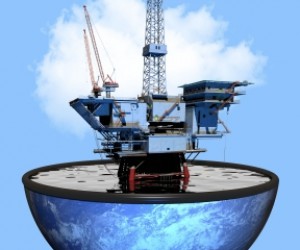Fracking is just as harmful to the environment as it is to the economy. The debate around fracking as a form of extracting natural gas has highlighted the gains to economic growth and job creation versus loss to pristine environments and social threats to small communities. Yet it is the economy that stands to lose the most.
Water underpins all economic activity through its use as a lubricant, coolant, cleaning fluid, or ingredient, as well as being a non-negotiable input into the survival of every human being, plant and animal involved in the economy and its abundance and price are likely to change considerably over the next century.
Temperatures in South Africa are predicted to increase between 1ºC and 3ºC while rainfall is expected to decrease by 5 percent to 10 percent. The distribution of rainfall is also forecast to change, resulting in less precipitation towards the west and interior of the country, while the east becomes wetter with rain falling in higher quantities but over fewer days. This increases flood risk and poses challenges to water catchment and the result is a significantly lower supply of usable water.
Fracking is highly water-intensive through its process. It works by drilling a deep horizontal well into the earth and pumping it with water, sand and chemicals in order to burst open the shale containing natural gas. Once open, the blasted hole is not reversible and gas will flow naturally to the surface via specialised tubing until the well needs to be redrilled approximately two to three years later.
Creating the well requires about 47 days and 20 million litres of water. Based on the current infrastructure proposals this equates to a water use of about 4 billion litres of water a 10km2. To put this into perspective; the entire water supply of the Western Cape Water Supply System servicing Cape Town and neighbouring cities is about 511 billion litres.
Half of the water used in fracking a well will end as contaminated and mildly radioactive waste water unsuitable for human or industrial use. Apart from the net loss of South Africa’s water resource that this creates, drilling companies are also unable to provide a guarantee that fracking will not contaminate ground water.
The justification for such high risks is the potential gains to job creation, yet fracking has shown to have a very low employment to production ratio. Job numbers must also not be confused for job creation; most of the jobs in fracking will come from qualified experts in the oil and gas industry and few will go to unskilled workers.
In the South African context this means no local job creation, but rather job transferring from other industries or the importation of foreign skills. Factor in the opportunity cost of not servicing South Africa’s energy needs through job-intensive industries such as green energies, and fracking could result in a net loss of employment.
Aside from the environmental damage, the real scars to be left by fracking are on the economy. Future resources will be threatened and contaminated, job creation will be slim, and most financial benefits will flow out of the country. It is an industry that has irreversible consequences and while it may provide short-term gains, South Africa will soon be found wanting for what has been destroyed in the process.










